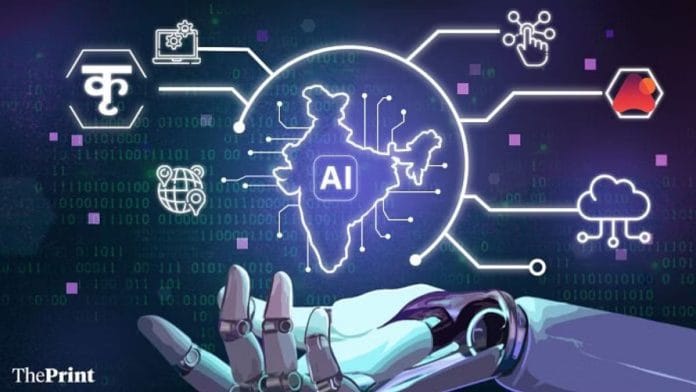New Delhi: The government announced a slew of measures to bolster artificial intelligence (AI) and skilling in the country, including the establishment of a new Centre for Excellence in AI for Education, with an allocation of Rs 500 crore in the 2025-2026 Budget unveiled on Saturday.
Finance Minister Nirmala Sitharaman’s announcement was part of a wider effort to integrate AI into key sectors and strengthen India’s technical and vocational education ecosystem.
The new centre will complement three such centres announced in 2023 in the fields of health, agriculture and sustainable cities. They were established last year with a total financial outlay of Rs 990 crore from 2023-24 to 2027-28.
“I announced three centres of excellence in artificial intelligence for agriculture, health and sustainable cities in 2023. Now, a centre of excellence in artificial intelligence for education will be set up with a total outlay of Rs 500 crore,” Sitharaman said in her Budget speech.
Union Education Minister Dharmendra Pradhan said that the fourth AI centre of excellence in education, envisioned in the Budget 2025-26, aims to revolutionise India’s educational system from pre-primary to professional and research levels.
“By harnessing artificial intelligence, it seeks to address disparities and inefficiencies, ensuring equitable and high-quality education across the nation. This Centre of Excellence in Artificial Intelligence for Education will be established with a total outlay of Rs 500 crore,” Pradhan told a press conference.
“In line with the NEP 2020, this transformative initiative will integrate AI-driven innovations to enhance teaching, assessment, and policy-making. It will foster an educational ecosystem that nurtures young talent and equips them to contribute to the vision of Viksit Bharat@2047.”
The finance minister also announced the establishment of five national skill development centres with global partnerships to support the government’s flagship ‘Make in India’ initiative.
“Building on the initiative announced in the July 2024 Budget, five National Centres of Excellence for skilling will be set up with global expertise and partnerships to equip our youth with the skills required for ‘Make for India, Make for the World’ manufacturing. The partnerships will cover curriculum design, training of trainers, a skills certification framework, and periodic reviews,” she said.
In school education, Sitharaman also announced the establishment of 50,000 Atal Tinkering Labs in government schools over the next five years to cultivate the spirit of curiosity and innovation and foster a scientific temper among young minds. The labs are designed to encourage students to be innovative and develop entrepreneurial skills.
She also announced plans to provide broadband connectivity to all government secondary schools and primary health centres in rural areas under the BharatNet project.
The finance minister proposed the Bharatiya Bhasha Pustak Scheme to provide digital-form Indian language books for school and higher education. “This aims to help students understand their subjects better,” she said.
Dr. Venkat Rangan, Vice-Chancellor of Amrita Vishwa Vidyapeetham, lauded the announcements.
“The emphasis on expanding access to quality education, strengthening research capabilities, and fostering scientific thinking through initiatives like Atal Tinkering Labs, AI excellence centres, and national skilling hubs will play a transformative role in shaping India’s future Bharatiya Bhasha Pustak Scheme is a commendable step towards inclusive and accessible learning,” he told ThePrint.
The budget allocation for the IndiaAI Mission, a national-level programme to democratise and catalyse the AI innovation ecosystem in the country and ensure the global competitiveness of AI startups and researchers of India, was increased to Rs 2,000 crore from last year’s Rs 551.75 crore budget estimate and Rs 173 crore revised estimate.
Also Read: Modi 3.0 gives giant relief to middle class—no tax on income up to Rs 12 lakh
Making learning more inclusive and accessible
Industry experts welcomed the announcements.
“By embedding AI in education, we are not only enhancing learning outcomes but also preparing students to navigate an AI-driven economy with confidence and competence,” said Jyotsna Singh, associate dean of computer engineering, Narsee Monjee Institute of Management Studies Chandigarh.
Alison Barrett, the British Council’s Country Director in India, said the Rs 500-crore allocation for a centre of excellence for AI in education was a step forward in nourishing “India’s technical and digital capabilities”.
Charan Lakkaraju, Founder and CEO of Student Tribe, a student community platform, added that the creation of the five national centres of excellence for skilling would ensure that learners gained “industry-aligned expertise, particularly in high-growth sectors”.
“Better technical and vocational training and implementation of the scheme for promoting ‘Bharatiya Bhasha Pustak’ means that learning becomes more inclusive, more accessible for everybody,” said Lakkaraju.
University Grants Commission (UGC) chairperson M. Jagadesh Kumar said the Bharatiya Bhasha Pustak scheme will promote inclusivity and enrich the educational experience.
“A substantial increase in funding for the Indian Knowledge System, rising from Rs 10 crore to Rs 50 crore in the 2025-26 budget, will empower researchers and institutions to explore further, document and disseminate India’s invaluable intellectual contributions. The move will significantly boost UGC’s efforts to prepare 22,000 textbooks for UG and PG students in 22 Indian languages,” he said.
(Edited by Sugita Katyal)
Also Read: 36 drugs to treat cancer, rare diseases exempted from basic customs duty in Union Budget 2025






